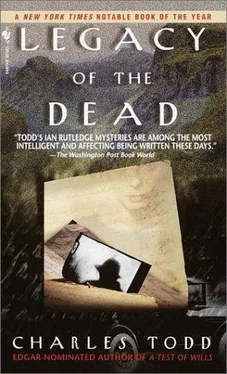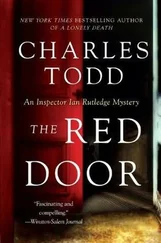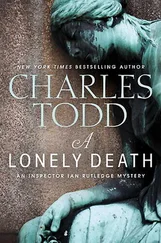Charles Todd - Legacy of the Dead
Здесь есть возможность читать онлайн «Charles Todd - Legacy of the Dead» весь текст электронной книги совершенно бесплатно (целиком полную версию без сокращений). В некоторых случаях можно слушать аудио, скачать через торрент в формате fb2 и присутствует краткое содержание. Жанр: Полицейский детектив, на английском языке. Описание произведения, (предисловие) а так же отзывы посетителей доступны на портале библиотеки ЛибКат.
- Название:Legacy of the Dead
- Автор:
- Жанр:
- Год:неизвестен
- ISBN:нет данных
- Рейтинг книги:5 / 5. Голосов: 1
-
Избранное:Добавить в избранное
- Отзывы:
-
Ваша оценка:
- 100
- 1
- 2
- 3
- 4
- 5
Legacy of the Dead: краткое содержание, описание и аннотация
Предлагаем к чтению аннотацию, описание, краткое содержание или предисловие (зависит от того, что написал сам автор книги «Legacy of the Dead»). Если вы не нашли необходимую информацию о книге — напишите в комментариях, мы постараемся отыскать её.
Legacy of the Dead — читать онлайн бесплатно полную книгу (весь текст) целиком
Ниже представлен текст книги, разбитый по страницам. Система сохранения места последней прочитанной страницы, позволяет с удобством читать онлайн бесплатно книгу «Legacy of the Dead», без необходимости каждый раз заново искать на чём Вы остановились. Поставьте закладку, и сможете в любой момент перейти на страницу, на которой закончили чтение.
Интервал:
Закладка:
Gibson came on very shortly to say, “Inspector Rutledge, sir?”
“Yes. I’m in need of good news. I hope you’re going to tell me you have found Eleanor Gray.”
“No, sir, that I haven’t. But I talked to suffragettes she’d marched with and was known to be friends with. They haven’t seen her in some three years. What they tell me is that she went off to Winchester one weekend and never came back to London. At least not as far as anyone knows. Most of the women thought Lady Maude had had enough of her daughter’s wild ways and sent for her.”
“Are they certain she actually went to Winchester? She could have lied about her plans.”
“Yes, sir, I thought of that, and took the liberty to call on the people she was to stay with. Miss Gray never got there. She was set to drive down with an officer she’d known in London. But she changed her mind at the last minute and said the two of them would be going to Scotland instead- he was on sick leave and it wasn’t up for another week. She promised to call back when she returned to London, but never did.”
Scotland! “Did you ask the name of this officer?” Rutledge asked.
“That I did, sir!” Gibson’s voice came strongly down the line. “But they’ve forgotten it. Still, it was someone she’d met before. Not a stranger, or she wouldn’t have asked to bring him to Winchester with her. They tell me she was not one to impose on her hostess in that way.”
“Well done, Gibson!” Rutledge said. “Do you have a number where I can reach these people in Winchester?”
He could hear down the line the shuffling of papers. “Yes, sir, here it is! A Mrs. Humphrey Atwood. She was the Honorable Miss Talbot-Hemings. Went to school with Miss Gray for a time and stayed friends.” There was a pause. Rutledge could hear a door shut. And then with a note of triumph, Gibson added, “The Chief Superintendent told me I wasn’t to bother talking to the suffragette ladies. Addled, all of them, he said. A waste of time.” There was another pause. “Bit of luck, wasn’t it, sir!”
If he hadn’t known Gibson better, Rutledge would have imagined him grinning ear to ear. It was there in the voice. But Gibson seldom smiled. He was also seldom wrong in his findings or his conclusions. He was the kind of man who took pride in himself and in his work, and was bulldog tenacious when he wanted to be. Only his eyes warned that inside the beefy, middle-aged body was a brain sharp as a razor. Rutledge had always suspected that Old Bowels and Gibson were enemies from years back.
That didn’t put Gibson in Rutledge’s column at the Yard. But it meant that an opportunity to blacken Chief Superintendent Bowles’s eye was savored by the man, and often produced information that Rutledge found valuable.
As in this case.
Rutledge thanked him and put up the receiver, standing there for all of a minute, thinking.
Here was the first tie between Eleanor Gray and Scotland. Secondhand it might be, but it was better than none.
Why would a man bring a woman some months pregnant from London to Scotland-unless he was the father of her child?
Hamish said, “Unless there wasna’ anyone else she could turn to, and he felt sorry for her.”
There was also that possibility, Rutledge acknowledged, opening the door of the little room and taking a deep breath of fresher air. But he thought it was more likely that the officer must have known the father, if indeed he wasn’t the father himself. He himself would have done as much for a friend at the Front.
He closed the door again and was on the point of asking for the number Gibson had given him, when he realized that he ought to go to Winchester himself.
It would mean a long, fast drive there and back, but it had to be done. A telephone was a device that allowed people to hide behind distance. Nothing said into the telephone could match the nuances of expression and tone of voice that he used so often to judge information and people.
Hamish said, “It’s been close to three years. It’s likely true they canna’ remember the officer’s name now.”
On the way to his room to pack what he needed, Rutledge answered, “Very likely. But you never can tell what other information they still have.”
16
Rutledge spent the night in the Midlands. HE had tried to persuade himself that he was good for another hour or more of driving. But heavy rain caught up with him, nearly blinding him. When he narrowly missed an unlit wagon going in the same direction, he pulled over, waiting for the worst of the downpour to pass. Only then did he recognize just how tired he was. There was an inn on the High Street of the next village, and rousing the owner from his bed, Rutledge asked for a room and was brought a tray of tea and dry sandwiches as well. He was on the road again as soon as it was light. By the time he arrived in Winchester, the stiffness in his back and legs was turning to cramp.
Hamish had spent most of Rutledge’s hours behind the wheel earnestly pulling apart the evidence against Fiona MacDonald and quarreling over the role Eleanor Gray might or might not have played.
It had been exceedingly difficult for Rutledge to explain Hamish’s existence, the reality of his voice, to the doctor at the clinic. He was not a ghost-ghosts could be exorcised. Nor was he a disembodied voice repeating Rutledge’s thoughts like a parrot. What was there was vivid-the nuances of thought and tone demanded answers. And Rutledge in 1916, broken in spirit and mind and nearly in body, had found it easier to answer the voice than to challenge it. He had known Hamish through two years of war- his memory was filled with conversations that had shaped new conversations-new thoughts-new fears.
In the five months since returning to the Yard, Rutledge had slowly found the courage to argue, to refute-to take on the voice in verbal battle. A painful step toward sanity, he told himself again and again-not away from it. But challenging it went beyond his courage still.
Hamish was saying, “It’s those bones in Glencoe that gave Oliver an excuse to bring a charge of murder against Fiona. He wouldna’ care about them, else. It’s no’ even his jurisdiction! It doesna’ matter to him whose they are.”
“True enough, but until we know how that woman died, we’re bound to take them into account,” Rutledge argued. “As long as her shadow-whoever she may be-falls over the evidence, it will obscure everything else.”
Hamish still disagreed. And said so. Rutledge shook his head.
“Eleanor Gray’s disappearance gave the police in Duncarrick a name to put to those bones. Identify the corpse- that’s the first rule of a murder inquiry. And Oliver is convinced that he has. Once that’s established, he has to find a clear connection between the two women. If Eleanor Gray was pregnant and came to Scotland to wait out her term, then the link begins to take shape. If that’s not true, then there has to be another explanation for her presence in Glencoe. And if it can be proved that the bones aren’t Eleanor Gray’s after all, Oliver is simply going to search for another identity to give them. Named or nameless, the woman is a stumbling block.”
“Aye, I grant you. But can you no’ see that named or nameless, it’s happenstance that connects these bones with Fiona in the first place. What if Oliver proves they belong to the Gray woman? What if he proves she was pregnant when she disappeared? It’s still a giant leap to prove Fiona killed her!”
“Or any other woman. I agree. But finding Eleanor Gray alive will eliminate her from the list. If she’s dead, and Oliver does have her body, then we’re back to the problem of how she died where she did. Murder-natural causes-even suicide. Whether the answer will clear Fiona or damn her isn’t the issue. We have to look for it. By the same token, if it turns out that Eleanor Gray was murdered, then we have to prove that Fiona was the only person who might have had a reason and opportunity to kill her. Oliver may be content to jump to conclusions, but the truth is, Lady Maude won’t be as easily satisfied.”
Читать дальшеИнтервал:
Закладка:
Похожие книги на «Legacy of the Dead»
Представляем Вашему вниманию похожие книги на «Legacy of the Dead» списком для выбора. Мы отобрали схожую по названию и смыслу литературу в надежде предоставить читателям больше вариантов отыскать новые, интересные, ещё непрочитанные произведения.
Обсуждение, отзывы о книге «Legacy of the Dead» и просто собственные мнения читателей. Оставьте ваши комментарии, напишите, что Вы думаете о произведении, его смысле или главных героях. Укажите что конкретно понравилось, а что нет, и почему Вы так считаете.












